- Home
- Beth Byers
Death by the Book: A 1930s Murder Mystery (Poison Ink Mysteries) Page 2
Death by the Book: A 1930s Murder Mystery (Poison Ink Mysteries) Read online
Page 2
Eunice had to have been as relieved as Georgette, but the maid simply nodded stalwartly and came back into the dining room a few minutes later with a fresh pot of strong tea, a full bowl of sugar, and the cream that had been intended for supper. It was still the cheapest tea that was sold in Bard’s Crook, but it was black and strong and tasted rather like nirvana on her tongue when Georgette drank it down.
“I’ll go up to London tomorrow. He wants to see me in the afternoon, but he states very clearly he wants the book. We’re saved.”
“Don’t count your chickens before they hatch, Miss Georgie.”
“By Jove, we aren’t just saved from a lack of cream, Eunice. We’re saved from goats! We’re saved my dear. Have a seat and enjoy a cuppa yourself.”
Eunice clucked and returned to the kitchen instead. They might be saved, but the drawing room still needed to be done, dinner still needed to be started, and the laundry and mending were waiting for no woman.
When Miss Marsh made her way into London the following day, she was wearing her old cloche, which was quite dingy but the best she had, a coat that was worn at the cuffs and the hem, and shoes that were just starting to have a hole worn into the bottom. Perhaps, she thought, there would even be enough to re-sole her shoes.
On the train into London from Bard’s Crook, only Mr. Thornton was taking the train from the village. When he inquired after her business, she quite shocked herself when she made up a story about meeting an old Scottish school chum for tea. Mr. Thornton admitted he intended to meet with his lawyer. He was rather notorious in Bard’s Crook for changing his will as often as the wind changed direction. An event he always announced with an air of doom and a frantic waggling of his eyebrows.
Mr. Thornton had married a woman from the factories who refused to acknowledge her past, and together they had three children. Those children—now adults—included two rebellious sons and one clinging daughter. He also had quite a slew of righteous nephews who deserved the acclaim they received. Whenever his wife bullied him too hard or his sons rebelled too overtly, the will altered in favor of the righteous nephews until such time as an appropriate repentance could be made.
Georgie had long since taken to watching the flip-flopping of the will with a delighted air. As far as she could tell, no one but herself enjoyed the changing of his will, but enjoying things that others didn’t seem to notice had long been her fate.
The fortunate news of the inheritance situation was that Mr. Thornton’s nephews were unaware of the changing of their fortunes. The clinging daughter’s fortune was set in stone. She never rebelled and thus never had her fortunes reversed, but she clung rather too fiercely to be a favored inheritor.
Mr. Thornton handed Miss Marsh down from the train, offered to share a black cab, and then left her without regret when she made a weak excuse. Miss Marsh selected her own black cab, cutting into her ready money dreadfully, and hoped that whatever occurred today would restore her cash in hand.
CHARLES AARON
“Mr. Aaron,” Schmidt said, “your afternoon appointment has arrived.”
“Wonderful,” Charles replied. “Send him in with tea, will you Schmidtty?”
“Her, sir.”
“Her? Isn’t my appointment with an author?” Charles felt a flash of irritation. He was very much looking forward to meeting the author of The Chronicles of Harper’s Bend. He had, in fact, read the book twice more since that first time.
Schmidt’s lips twitched when he said, “It seems the author is a Miss Marsh.”
Charles thought over the book and realized that of course Mr. Jones was a Miss Marsh. Who but a woman would realize the fierce shame of bribing one’s children with candies to behave for church? Charles could almost hear the tirade of his grandmother about the lack of mothering skills in the upcoming generations.
“Well, send her in, and tea as well.” Charles rubbed his hands together in glee. He did adore meeting new writers. They were never what you expected, but they all had one thing in common. Behind their dull or beautiful faces, behind their polite smiles and small talk, there were whole worlds. Characters with secrets that only the writer knew. Unnecessary histories that were cut viciously from the story and hidden away only to be known by the author.
Charles rather enjoyed asking the writers random questions about their characters’ secret histories. Tell me, author, Charles would say, as they shared a cup of tea or a pipe, what does so-and-so do on Christmas morning? Or what is his/her favorite color? He loved when they answered readily, knowing that of course so-and-so woke early on Christmas morning, opened presents and had a rather spectacular full English only to sleep it off on the Chesterfield near the fire.
He loved it when they described what they ate down to the nearest detail as though the character’s traditional breakfast had been made since time immemorial rather than born with a pen and hidden behind the gaze of the person with whom Charles was sharing an hour or two.
Charles had long since become inured to the varying attitudes of authors. Thomas Spencer, who had given Charles a rather terrible headache that had been cured by Miss Marsh’s delightful book, wore dandified clothes and had an arrogant air. Spencer felt the cleverness of his books justified his rudeness.
On the other hand, an even more brilliant writer, Henry Moore, was a little man with a large stomach. He kept a half-dozen cats, spoiled his children terribly, and was utterly devoted to his wife. In a gathering of authors, Moore would be the most successful and the cleverest by far but be overshadowed by every other writer in attendance.
Miss Marsh, Charles saw, fell into the ‘Moore’ category. She seemed as timid as a newborn rabbit as she edged into his office. Her gaze flit about, taking in the stack of manuscripts, the shelf of books he’d published over the course of his career, the windows that looked onto a dingy alleyway, and the large wooden desk.
She was, he thought, a dowdy little thing. Her eyes were nice enough, but they barely met his own, and she didn’t seem to know quite what to say. Her freckles seemed to be rather spectacular—if one liked freckles—but it was hard to know anything with her timid movements. Especially with her face barely meeting his own. That was all right, he thought, he’d done this many times, and she was very new to the selling of a book and the signing of contracts.
“Hello,” he said rather cheerily, hoping that his tone would set her at ease.
She glanced up at him and then back down, her gaze darting around his office again. Mr. Aaron wondered just what she was seeing amidst all of his things. He wouldn’t be surprised to find she was noting things that the average fellow would overlook.
“Would you like tea?”
Miss Marsh nodded, and he poured her a cup to which she added a hefty amount of cream and sugar. He grinned at the sight of her milky tea and then leaned back as she slowly spun her teacup on the saucer.
“Why Joseph Jones? Why a pen name at all?”
Miss Marsh blinked rather rapidly and then admitted, “Well…” Her gaze darted to the side, and she said, “I was rather inspired by my neighbors, but I would prefer to avoid their gossip as well. Can you imagine?” A cheeky grin crossed her face for a moment, and he was entranced. “If they discovered that Antoinette Moore wrote a book?”
“Is that you?”
“Pieces of her,” she admitted, and he frowned. The quiet woman in front of him certainly had the mannerisms of the character, but he couldn’t quite see Miss Moore writing a book and sending it off. She was such an innocuous, almost unnecessary character in the book.
Was Miss Marsh a literary portraitist? He grinned at the idea and wanted nothing more than to visit Harper’s Bend or wherever it was that this realistic portrayal existed in real life. What he would give to have an afternoon tea with the likes of Mrs. Morton and her ilk.
Mr. Aaron glanced over Miss Marsh. Her old cloche and worn coat were not lost on him, and he supposed if he’d met her anywhere else he’d never have looked at her twice. Having read her book, however, he suddenly felt as though she were far more charming than she’d otherwise have been.
Her gaze, with ordinary medium brown eyes, seemed to have untold depths, and her freckles seemed to be an outward indicator of a woman who could look at her village and turn it into a witty caricature, acting as a warning that this was a woman who said nothing and noticed everything.
He grinned at her. “I read your book, and I liked it.”
Her eyes flashed and a bright grin crossed her face, and he realized she was a little prettier than he’d noticed. It was that shocked delight on her face that made him add, “I like it quite well indeed.”
Miss Marsh clasped her hands tightly together, and Mr. Aaron did not miss how her grip camouflaged the trembling of her hands.
“Tell me about it,” he said kindly. “Why did you write it? This is a portrait of your neighbors?”
It was the kindness that got Miss Marsh to open up, and then she couldn’t seem to stem the tide of her thoughts; they sped out. “Well, it was my dividends you see. They’ve quite dried up. I was struggling before, but they’d always come in and then they didn’t, and I was quite—” Miss Marsh trailed off and Mr. Aaron could imagine the situation all too easily. “at my wit’s end. Only then I thought of Louisa May Alcott and the other lady writers, and I thought I might as well try as not.”
The world was struggling and Miss Marsh, who may have escaped the early failing of things, had eventually succumbed as so many had. As she said, her dividends had dried up. He could imagine her lying awake worried and uncertain or perhaps pacing her home. There was something so unpretentious about her revelation that Mr. Aaron was even more charmed. She’d come to the end of things, and she’d turned that worry into the most charming of stories. Not just a charming
story, but one filled with heart and delight in the little things. He liked her all the better for it.
Chapter 3
When Mr. Aaron brought the contract for Miss Marsh to sign, she didn’t ask any questions as she read and signed. He watched her in utter consternation, thinking she very much needed a protector. He admitted the contract was fair, but did she know it was fair? Or was she just trusting him? She glanced up at him with those sweet, honey brown eyes and felt certain she was trusting him. His gaze focused on her again. Her pale skin with the freckles, the sweet gaze, the hidden cleverness. She seemed a puzzle that only he had solved.
“Did you want to take the contract and talk with someone about it?”
She shook her head.
It was a fair contract, perhaps more generous than a new writer with no history deserved, but he felt confident that her book would do well, and he wanted to cultivate her trust. Loyal, talented authors who didn’t change their publishers as often as they changed their shoes were the backbone of publishing companies like Aaron & Luther. He suspected that Miss Marsh would be utterly loyal to his company as long as he was fair.
“Miss Marsh, I—”
That cheeky grin crossed her face again, and she admitted, “I would sell it to you if it were unfair, Mr. Aaron. I am rather at the end of things. It is fair, isn’t it?” Those medium brown eyes crossed his face once again, and he felt that even if hadn’t been fair, he would have changed it in that moment just to make it so.
He nodded once, and she smiled that cheeky grin at him catching at his imagination more thoroughly than even his book.
Miss Marsh signed with a neat signature and accepted the cheque with bright eyes that told him she was desperate for money even if she hadn’t admitted it to him. He felt both understanding and sympathy when she rapidly blinked away the shine from her eyes. Times were hard and more than one business or family or person had gone from comfortable to ruined. He had walked the edge more than he’d like with his company, but he’d been fortunate to have a few successful authors who were as loyal as he hoped Miss Marsh would be.
“This is the beginning of something lucrative for us both, I think,” he told her, but she didn’t believe him. Her gaze flicked to his face, doubt evident, and then quickly to the side to hide those thoughts of hers.
If she wrote about her neighbors, then Robert and himself were the only people to have read her book. She wouldn’t have received the praise of a good friend or a well-trusted neighbor like so many did before they sent their books off, so she may well be entirely unaware of what a good book she’d written. She’d learn that he wasn’t playing with her emotions when she saw the sales and the reviews come in. “I look forward to what you write next.”
“Oh,” Miss Marsh breathed, looking shocked at the idea. “Another book?”
He grinned at her and gave her a wink. He’d learned long ago the power of ready money to persuade an author to write. The first books were written out of a nebulous desire to accomplish a life-long goal or perhaps, like with Miss Marsh, the need for money. Once authors realized what they had done, they often ended up in a surreal haze of delight where they could do things like afford a new coat. Something he hoped Miss Marsh would do for herself, along with a new hat.
Once the author’s basic needs were met, the idea of perhaps having new shoes or even a trip to the seashore persuaded them to return to their pen and paper and craft another story. Somewhere along the way—writing became their life and story ideas abounded, too many to ever write. Charles Aaron had very little concern that he would not see another story from Miss Marsh, although, he wanted it already. He’d found his mind returning to the story she’d crafted. He wanted more—which was how he always knew when he had a winner.
“Write me another book, please?”
Her head cocked and she examined him as if he were a very strange sort of creature?
“Another book?”
“Please.”
“For this much again?”
“Perhaps even more if the book does as well as I expect.”
Her gaze widened and she asked, “But what shall I write?”
“Throw someone else into your little town and cause trouble.”
She frowned a little and then said, “Well…I suppose I could do it once more.”
“I would be ever so delighted to see what happens with Miss Moore next,” Charles told her and then realized he was very, very curious about what would happen next with Miss Marsh.
Charles saw Miss Marsh out and regretted when she left. There was something about the way she took in the world around her. He felt as though she was seeing things that he wasn’t. It was probably why her book was so clever.
Normally he’d have stopped at the doorway to his office, but he ended up seeing her down the stairs and hailing a black cab for her. She seemed dazed when she left. This was a book he’d hurry to print, he thought. The perfect lightness for the autumn. The rains would come, the clouds would cover the sky, and readers would be able to curl up into the cheery brightness of Miss Marsh’s little book.
GEORGETTE MARSH
Miss Marsh sat back in the black cab as the man asked, “Where to, ma’am?”
She flinched a little at the ma’am. She was only twenty-seven years old. She supposed that if it were Jane Austen’s time, she’d be the dowdy woman who had long since given up hope of marrying. She’d be…yes, Charlotte Lucas. Georgette was the somewhat clever friend who succumbed to the advances of the horrible Mr. Collins by telling herself that she was not romantic.
A moment later, Georgette gave the cabbie the location of a bank. He didn’t note the sudden brightness in her eyes. It wasn’t present in her soft voice as she arranged for him to wait for her while she deposited the cheque into her account. The overdraft would be resolved and cream would be a ready thing again.
No, she thought, as she walked out of the bank with a new lightness of step. Across the street was a little teashop, and Georgette’s eyes brightened with avarice. No, not Charlotte, Georgette told herself as she hurried between the cars and darted inside. She was going to splurge on tea, and it was going to be wonderful. As she ordered the best of English breakfast tea, a delightful herbal mixture for the evening that smelled of oranges and spice along with some Chinese blends, Georgette’s mind returned to Charlotte Lucas.
Not Charlotte, Georgette told herself. Charlotte had given in to the fate placed before her, and Georgette had found another way. She had published a book! She had resolved her failing dividends and reset her monies. She had…self-knowing struck Georgette…she was, she thought, a Charlotte after all. If Mr. Collins had offered Georgette a saving hand, she’d have accepted his rescue. The difference between Charlotte Lucas and Georgette Marsh was that no Mr. Collins had come at just the right moment.
Her pride was gone again as she returned to the black cab and had him take her to the train station. Mr. Thornton was not returning on the same train, so Georgette could stare out the window and watch the day roll by and her village appear.
When she walked down the street, her secret was bright in her eyes and her spirit, but no one noticed. Mrs. Thornton, the will-changer’s wife, nodded to Georgette and she passed by in her motorcar. Dr. Wilkes waved a cheery hello and asked Georgette how she was, but hurried without listening to the answer. She didn’t take it personally; she noted his doctor’s satchel and the dark circles under his eyes. She’d heard that the Smith children had the measles and that Mr. Nyman was doing poorly. She was happy, in fact, to see Dr. Wilkes had pushed his glasses up on his head. He glanced up as he hurriedly moved down the street, closing his eyes and soaking in what sunshine was possible.
Towards the wood at the end of the lane, the soft and sweet Eliza Evans ushered her silent little girls towards the trees where she’d try and fail to get them to play happily. They each carried dolls that looked as new and perfect as they were the day they were given to the little girls.
The doctor’s wife, Mrs. Wilkes, met Mrs. Evans as they entered the wood. The Wilkes boys were wild and dirty, and they raced ahead of the Evans girls who flinched as the boys passed, but Georgette noted how the little girls’ heads turned following the whooping boys.

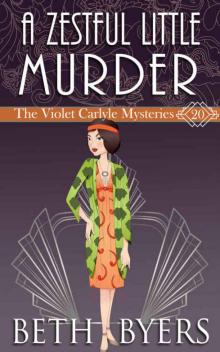 A Zestful Little Murder
A Zestful Little Murder The Violet Carlyle Mysteries Boxset 1
The Violet Carlyle Mysteries Boxset 1 Murder at the Ladies Club
Murder at the Ladies Club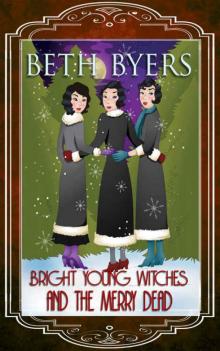 Bright Young Witches and the Merry Dead
Bright Young Witches and the Merry Dead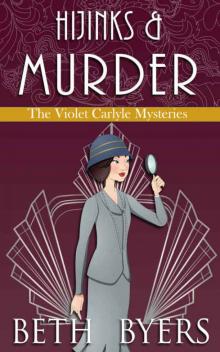 Hijinks & Murder
Hijinks & Murder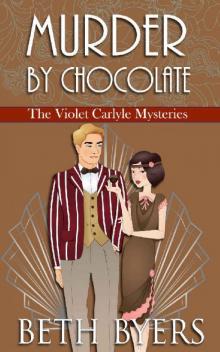 Murder By Chocolate
Murder By Chocolate Aeronaut Gone
Aeronaut Gone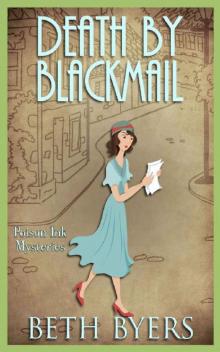 Death by Blackmail
Death by Blackmail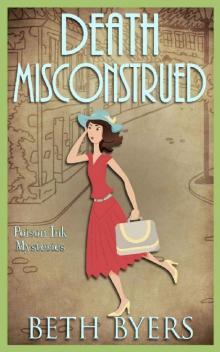 Death Misconstrued
Death Misconstrued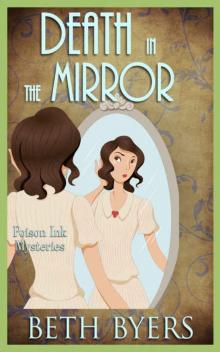 Death in the Mirror
Death in the Mirror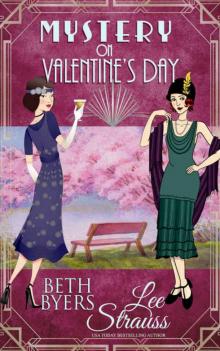 Mystery on Valentine's Day
Mystery on Valentine's Day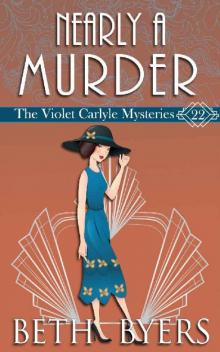 Nearly A Murder: A Violet Carlyle Historical Mystery (The Violet Carlyle Mysteries Book 22)
Nearly A Murder: A Violet Carlyle Historical Mystery (The Violet Carlyle Mysteries Book 22)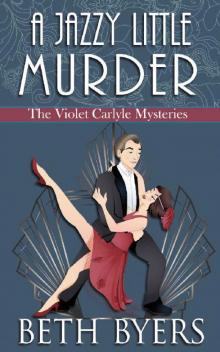 A Jazzy Little Murder
A Jazzy Little Murder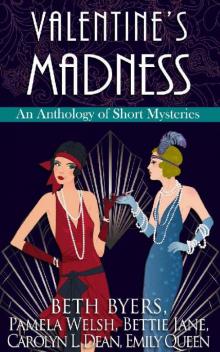 Valentine's Madness: A 1920s Historical Mystery Anthology
Valentine's Madness: A 1920s Historical Mystery Anthology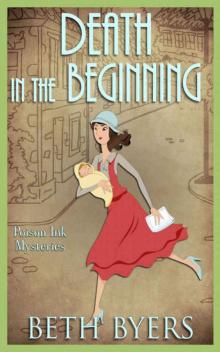 Death in the Beginning
Death in the Beginning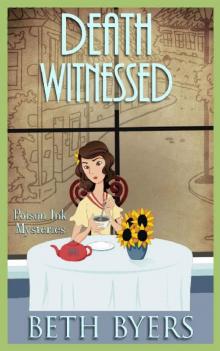 Death Witnessed
Death Witnessed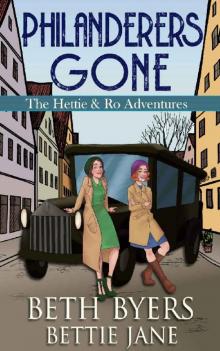 Philanderers Gone
Philanderers Gone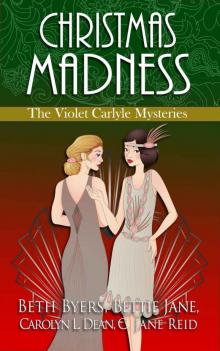 Christmas Madness
Christmas Madness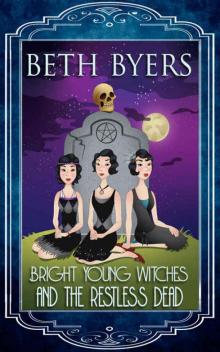 Bright Young Witches & the Restless Dead
Bright Young Witches & the Restless Dead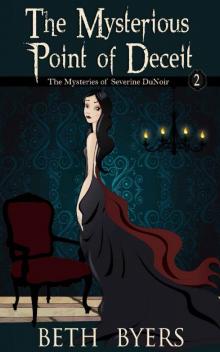 The Mysterious Point of Deceit
The Mysterious Point of Deceit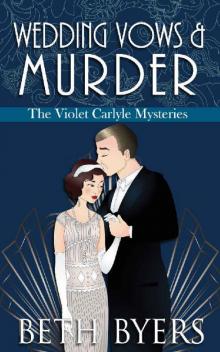 Wedding Vows & Murder
Wedding Vows & Murder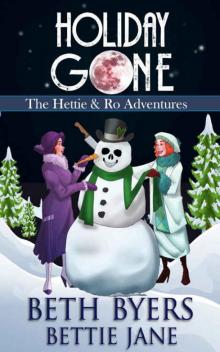 Holiday Gone
Holiday Gone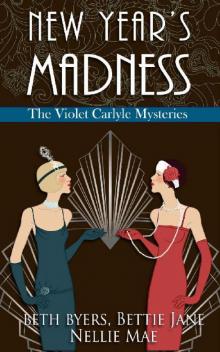 New Year's Madness:
New Year's Madness: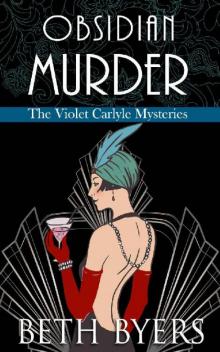 Obsidian Murder
Obsidian Murder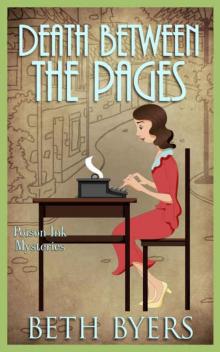 Death Between the Pages
Death Between the Pages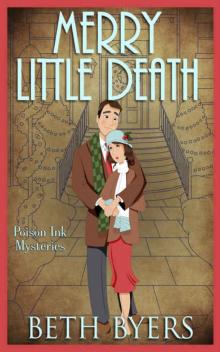 A Merry Little Death
A Merry Little Death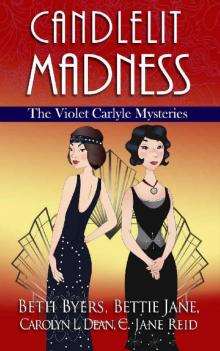 Candlelit Madness: A 1920s Historical Mystery Anthology including Violet Carlyle
Candlelit Madness: A 1920s Historical Mystery Anthology including Violet Carlyle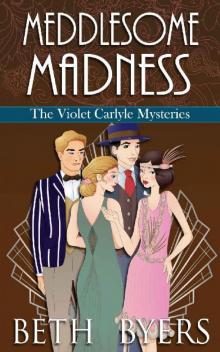 Meddlesome Madness: A Short Story Collection
Meddlesome Madness: A Short Story Collection The Violet Carlyle Mysteries Boxset 2
The Violet Carlyle Mysteries Boxset 2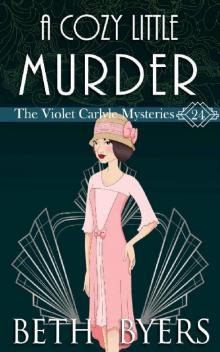 A Cozy Little Murder: A Violet Carlyle Cozy Historical Mystery (The Violet Carlyle Mysteries Book 24)
A Cozy Little Murder: A Violet Carlyle Cozy Historical Mystery (The Violet Carlyle Mysteries Book 24)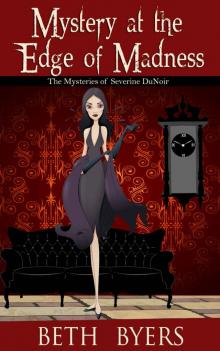 Mystery at the Edge of Madness
Mystery at the Edge of Madness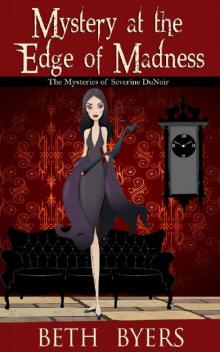 Mystery at the Edge of Madness: A Severine DuNoir Historical Cozy Adventure (The Mysteries of Severine DuNoir Book 1)
Mystery at the Edge of Madness: A Severine DuNoir Historical Cozy Adventure (The Mysteries of Severine DuNoir Book 1)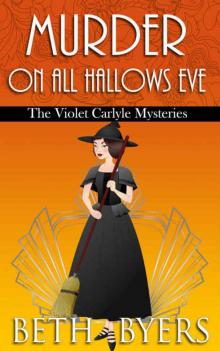 Murder on All Hallows
Murder on All Hallows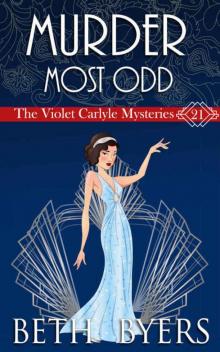 A Murder Most Odd
A Murder Most Odd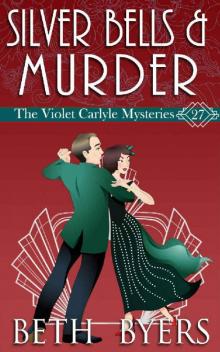 Silver Bells & Murder: A Violet Carlyle Historical Mystery
Silver Bells & Murder: A Violet Carlyle Historical Mystery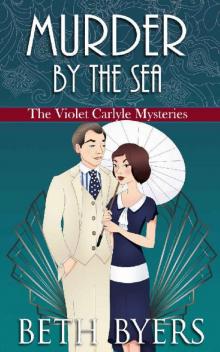 Murder by the Sea
Murder by the Sea Lemonade & Loathing
Lemonade & Loathing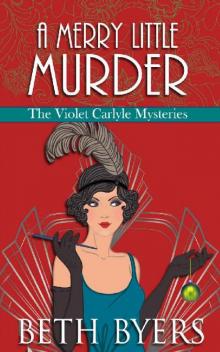 A Merry Little Murder
A Merry Little Murder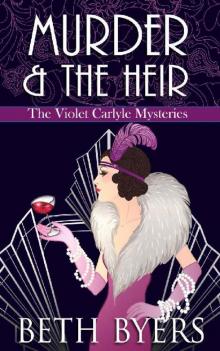 Murder & The Heir
Murder & The Heir Scones & Scandal
Scones & Scandal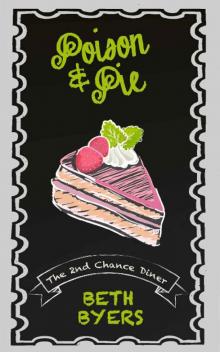 Poison & Pie
Poison & Pie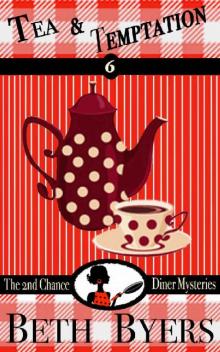 Tea & Temptation: A 2nd Chance Diner Cozy Mystery
Tea & Temptation: A 2nd Chance Diner Cozy Mystery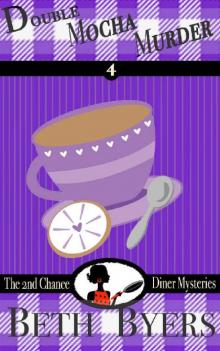 Double Mocha Murder: A 2nd Chance Diner Cozy Mystery
Double Mocha Murder: A 2nd Chance Diner Cozy Mystery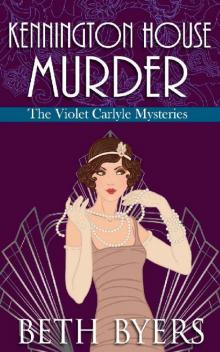 Kennington House Murder: A Violet Carlyle Cozy Historical Mystery (The Violet Carlyle Mysteries Book 2)
Kennington House Murder: A Violet Carlyle Cozy Historical Mystery (The Violet Carlyle Mysteries Book 2) The Pumpkin Problem
The Pumpkin Problem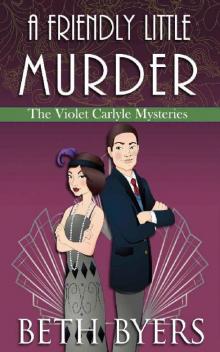 A Friendly Little Murder
A Friendly Little Murder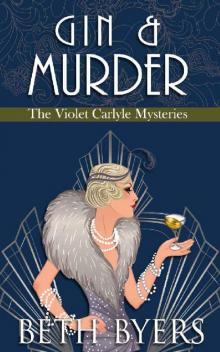 Gin & Murder
Gin & Murder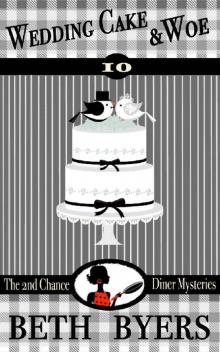 Wedding Cake & Woe
Wedding Cake & Woe Donuts & Danger: A 2nd Chance Diner Cozy Mystery
Donuts & Danger: A 2nd Chance Diner Cozy Mystery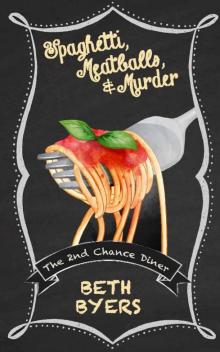 Spaghetti, Meatballs, & Murder
Spaghetti, Meatballs, & Murder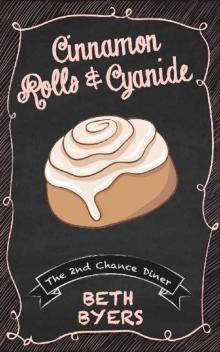 Cinnamon Rolls & Cyanide
Cinnamon Rolls & Cyanide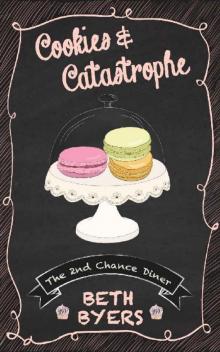 Cookies & Catastrophe
Cookies & Catastrophe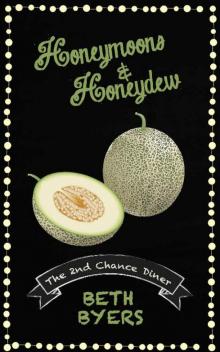 Honeymoons & Honeydew
Honeymoons & Honeydew